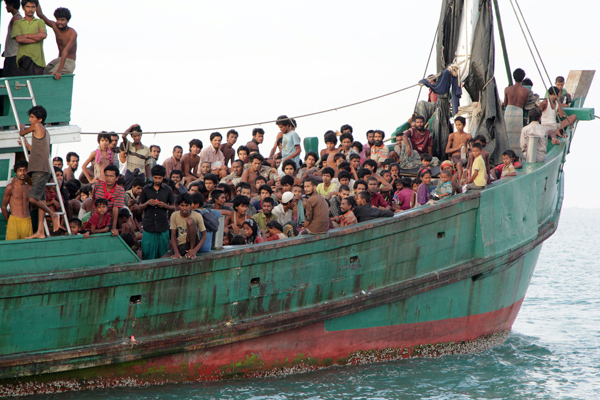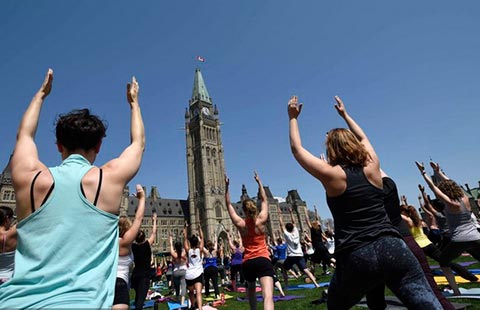Malaysia, Indonesia to let 'boat people' come ashore
Updated: 2015-05-21 09:30
(Agencies)
|
||||||||
 |
|
Migrants sit on their boat as they wait to be rescued by Acehnese fishermen on the sea off East Aceh, Indonesia, May 20, 2015. [Photo/IC] |
KUALA LUMPUR - Malaysia and Indonesia said on Wednesday they would offer shelter to 7,000 "boat people" adrift at sea in rickety boats but made clear their assistance was temporary and they would take no more.
More than 3,000 migrants have landed so far this month in Malaysia and Indonesia. Together with Thailand, they have pushed away many boats that approached their shores despite appeals from the United Nations to take them in.
In a joint statement in Kuala Lumpur, Malaysia and Indonesia emphasised that the international community also had a responsibility to help them deal with the crisis.
The migrants are mostly Rohingya Muslims from Myanmar and Bangladeshis - men, women and children who fled persecution and poverty at home or were abducted by traffickers, and now face sickness and starvation at sea.
"What we have clearly stated is that we will take in only those people in the high sea," Malaysian Foreign Minister Anifah Aman said. "But under no circumstances would we be expected to take each one of them if there is an influx of others."
Both countries said they would offer "resettlement and repatriation", a process that would be "done in a year by the international community".
The United Nations, which has been calling on governments in the region to rescue those drifting at sea, welcomed the move and urged that people be brought to shore without delay.
The United States was prepared to provide financial and resettlement aid to help deal with the crisis, Acting State Department Spokeswoman Marie Harf told a briefing in Washington.
Washington was also prepared to take a leading role in any multi-country effort organised by the United Nations High Commissioner for Refugees (UNHCR) to resettle the most vulnerable migrants, she said.

 Premier Li rides on new China-made train in Rio de Janeiro
Premier Li rides on new China-made train in Rio de Janeiro
 Disney flagship store opens in Shanghai
Disney flagship store opens in Shanghai
 Sinkhole glimpse of magical nature
Sinkhole glimpse of magical nature
 Top 10 hottest destinations for investment in 2015
Top 10 hottest destinations for investment in 2015
 Jia Zhangke's movie screened at Cannes
Jia Zhangke's movie screened at Cannes
 Premier Li meets entrepreneurs on China-made ferry in Rio de Janeiro
Premier Li meets entrepreneurs on China-made ferry in Rio de Janeiro
 Premier Li rides on new China-made train in Rio de Janeiro
Premier Li rides on new China-made train in Rio de Janeiro
 Jetman duo zip across Dubai sky
Jetman duo zip across Dubai sky
Most Viewed
Editor's Picks

|

|

|

|

|

|
Today's Top News
China to provide twin boost to Brazil economy
OPEC turn down Chinese requests for extra oil
Beijing concerned as US accuses 6 Chinese of economic spying
Lenovo, Alibaba in 'smart' alliance
Li urges firms to introduce more world-class products
China, Brazil launch new era of economic relations
China premier 'savior' to Brazil government: newspaper
US should end its 'backyard' zero-sum game
US Weekly

|

|






